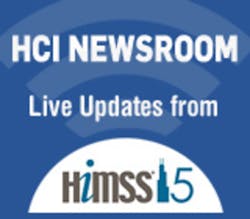More than 90 percent of survey respondents are utilizing mobile devices within their organizations to engage patients in their healthcare, according to new research revealed at the Healthcare Information and Management Systems Society (HIMSS) conference in Chicago.
The fourth annual HIMSS mobile survey, which included more than 200 healthcare provider employees, also showed that respondents believe that mHealth technologies are beginning to drive cost savings and improve the quality of care delivered. Respondents of this year’s survey reported leveraging a variety of mobile tools including: app-enabled patient portals (73 percent), telehealth services (62 percent) and text communications (57 percent). Of these technologies, 36 percent of respondents believe the use of app-enabled patient portals is the most effective tool in patient engagement to date.
During a 30-minute briefing on the study's results at the McCormick Place Convention Center on April 14, Jennifer Horowitz, senior director of research, HIMSS Analytics, noted that the survey made sure to include qualification questions such as 'Are you involved in mobile strategy at your organization' and 'Are you an end user?' "We wanted to make sure they were really involved before opening the gate," Horowitz said.
In general, researchers wanted to get an idea of how mature the respondents' mobile environment was, and the data showed that providers' mobile technology was indeed more robust than in previous years. "Is it something that IT leadership prioritizes? We asked folks to answer on a 1-to-7 scale, and the average response to this question was about a 5, which we say is fairly high," Horowitz said. Mobile policy wise, 57 percent of providers said that they have mobile technology in place to guide strategy, and providers are thinking about including management of lost and stolen devices into their policies, Horowitz noted.
Regarding patient portals, 73 percent said they are leveraging app-enabled ones. "I've heard at the conference this week and in the past that people say 'the technology in place is great, but can we actually use it to engage'?" said Horowitz. "We did ask how effective it was, and while 73 percent said they're using portals, 36 percent said they are highly effective, or a 6 or 7 on the scale. Organizations are starting out on the journey, and that needs to continue," she said.
Further, when asked about patient-generated health data (PGHD), 14 percent reported that all or most data generated by mobile devices is integrated into the electronic health record (EHR), while 52 percent reported that some data is integrated into the medical record.“mHealth continues to evolve as a tool to drive healthcare efficiencies. The proposed meaningful use Stage 3 rule realizes this with the concept of APIs and patient generated health data, and this year’s survey showed that the wide spread availability of mobile technology has had a positive impact on the coordination of patient care,” said David Collins, senior director of the HIMSS mHealth community.
The study also took a look into the future. While 83 percent of respondents strongly felt that their organization should deploy mobile devices, in current organizational policies, only about half of respondents said they have a strategic level of direction towards that. Thirty-one percent did say they have an organization-specific app, while 62 percent indicated future mobile policies will include app reviews.
The survey additionally looked at two more areas of healthcare that mHealth technologies have an impact on—cost savings and patient care. While 51 percent of survey respondents indicated budget tolls as a key barrier to further implementation of mobile technologies, 54 percent indicated they had achieved cost savings when asked if the deployment of mobile technology had a positive effect in this capacity. Specifically, areas of impact included preventative support care (24 percent), telehealth interventions (23 percent) and resource utilization (21 percent). Horowitz also noted that organizations have indicated that mobile technology has helped them with avoidable readmissions, as 20 percent of providers see value in using mobile for cost reduction across the care continuum.
In addition, survey participants were asked to identify ways in which they were able to leverage mobile technology to impact patient care. Results showed that 51 percent of survey participants indicated their organization witnessed a positive impact have stemmed from telehealth interventions, including the use of remote ICUs or teleradiology services and the ability to coordinate care across the care continuum, which includes the use of remote patient monitoring tools. There was also a trend in using mobile technology for preventative care via wellness challenges and the like, said Horowitz. "Organizations have indicated that mobile technology has helped them with direct patient-to-provider communication, achieve cost savings, and most importantly, care for patients," she said.


